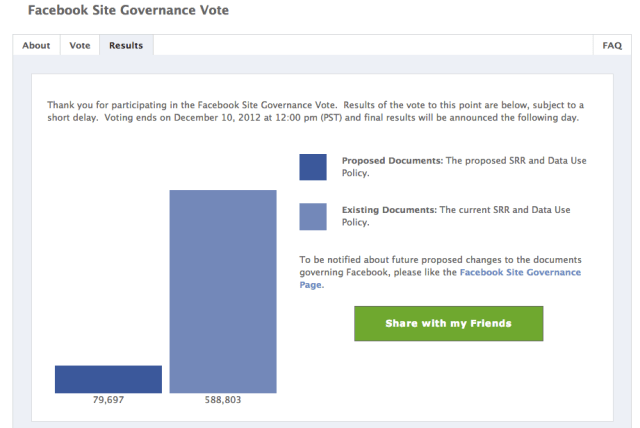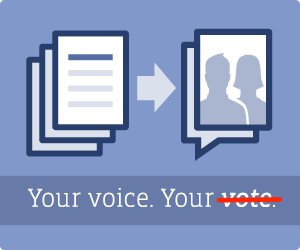The polls have closed on Facebook’s final site governance vote, with 588,803 votes (88 percent) opposed to the changes, and 79,697 of the total 668,500 in support. But since fewer than 30 percent of users voted, Facebook will implement the changes — eliminating the voting structure and integrating Instagram data. Facebook will seek feedback on future changes via other channels, and is free to use Facebook data to target eventual Instagram ads.
The vote that ended today at noon Pacific time was the biggest in Facebook’s history, surpassing a vote in April 2009 that saw 665,000 people cast their ballots. Still, only 0.0668 percent of the site’s user base voted. Since the 300 million-vote threshold for a binding vote wasn’t met, the strong opposition to the changes will only be taken under advisement and Facebook may implement the changes. [Update: There is a chance Facebook could revise the changes further or only implement some of them.]
Now an independent auditing firm will analyze the results of the vote to ensure they’re legitimate. Facebook is likely to make an announcement tomorrow about the vote’s results and when the new versions of its Statement Of Rights And Responsibilities and Data Use Policy will go into effect.
Instead of putting changes up for comment and then a vote if 7,000 comments are received, Facebook will now attempt to pull in more qualitative feedback on how users feel about proposed site governance and policy changes. Users will be able to submit questions to the site’s Chief Privacy Officer Erin Egan and chime in on webcasts with Facebook’s policy team. Though this might be seen as a slight to users, the old voting system was badly broken. There was likely a better compromise available than simply eliminating the vote, but that time has passed.

Beyond the end of Facebook’s experiment with democracy, the most interesting outcome of the vote is that Facebook will be able to intermingle data with its affiliates, including Instagram. That means any Instagram user that also has a Facebook account could have their personal Facebook data used to target them with ads on Instagram. Of course, Instagram doesn’t show any ads yet, but many suspect it will start in the near future.
Instagram’s minimalist sign-up flow and bare-bones profile means it doesn’t collect a ton of data about who its users are. That could have posed a problem for targeting them with ads. But with this policy change OK’d, it’s legal to use gender, hometown, interests, work history, and other Facebook data to make these potential ads as relevant as possible. Facebook might finally start directly earning back the $715 million it paid for the photo-sharing app.
